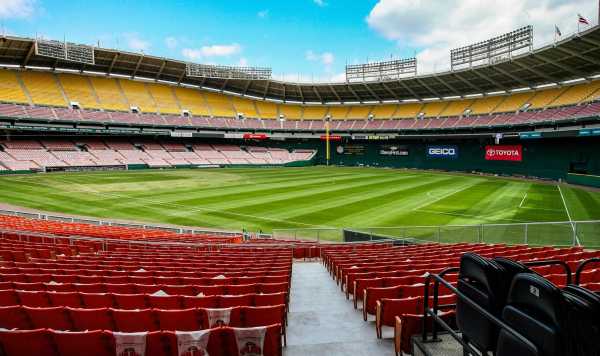The Washington Football Team, although it lost its name, has regained its connection to the city.

Credit: Tony Quinn/Shutterstock Loading the Elevenlabs Text to Speech AudioNative player…
It's no longer worth saying that Washington, D.C., is a city without a unique culture. The fact that its professional football team, despite all the difficulties, is finally returning to RFK Memorial Stadium disproves that myth. The Commanders may have abandoned their historic name, but they have reconnected with their hometown.
The very idea of a team moving back from the suburbs is remarkable. The trend is usually in the opposite direction. Right now, the Chicago Bears are desecrating Soldier Field, the NFL’s oldest and most venerable stadium, with plans to move to Arlington Heights. The Cleveland Browns are considering a similar move that would take the team out of the city and across Lake Erie to a less desirable part of Ohio. The Denver Broncos are also considering moving from their unattractive downtown to an equally unattractive location in the Rockies. The only team that I can think of that has moved in the opposite direction in the last 25 years is the Detroit Lions, whose fan base is as loyal and beleaguered as Washington’s.
The Lions returned to downtown Detroit because the struggling city offered the team significant financial incentives to develop abandoned and undesirable properties. That situation did not arise in the Commanders’ deal, announced Monday at a joint press conference by Mayor Muriel Bowser and team owner Josh Harris. Under the terms of the agreement, which still requires approval from the D.C. City Council, the Commanders will invest $2.7 billion to redevelop the RFK site, while the city will provide the remaining $1 billion. The team will also cover any cost overruns. The stadium is expected to open in 2030, and Bowser and Harris say they also intend to invest in the surrounding area.
A billion dollars sounds like a lot of money for taxpayers, and it certainly is. But overall, the city got a pretty good deal when it comes to these kinds of things. Harris will cover more than 75 percent of the cost of building the new stadium. By comparison, in the proposed stadium deals in Cleveland and Chicago, team owners are willing to put up 50 percent, at best.
Subscribe Today Get Daily Emails Delivered to Your Inbox Email Address:
What’s most impressive, however, is that the deal happened. Bowser had been trying for years to convince the team to move to the city. Harris’s predecessor, Dan Snyder, also sought to move to RFK but was an inept negotiator; he never knew how to work with Congress or City Hall. Still, the end of his failed tenure may have opened the door to a deal that once seemed like a pipe dream. Snyder changed the Redskins’ name twice, a sticking point for city officials. He also made a last-ditch effort to move the Commanders from Maryland to Virginia, signaling that the team had truly exhausted its options at FedEx Field.
During the second name change, Bowser suggested that if the team wanted to “get back to winning,” they should return to their hometown. Apparently, Harris, who grew up in Chevy Chase, Maryland, during the glory days of Joe Gibbs, agreed. After a successful season last year that saw the team fall just short of the Super Bowl after losing the NFC Championship, Harris began to seriously consider returning the team to what he calls its “spiritual home.” And now that dream is becoming more of a reality every day.
At the exit from
Sourse: theamericanconservative.com






